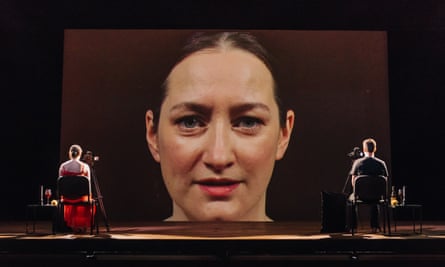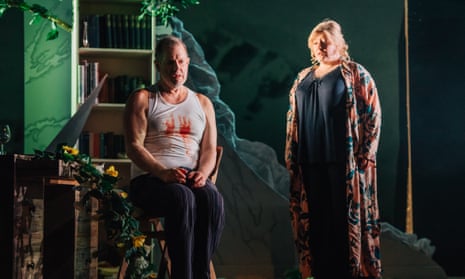The walls weep. The flowers bleed. The lake is made of tears. Bluebeard’s Castle (1911), Bartók’s one-act opera for two singers and large orchestra, lasts an hour and haunts you afresh with each encounter. It may be a grownup fairy story, steeped in Freud and Kafka, exploring that customary split – not so easy in our own times – between masculinity and femininity. Yet the drama works on a literal level too, fantasy castle with its seven locked doors aside. Two people want to make a life together but cannot negotiate the sorrows, the enigmas of the past. Scottish Opera evidently revels in this early 20th-century melancholic terrain. Their recent Pelléas et Mélisande (1902) was outstanding. So, too, is this new Bluebeard, conducted by Sian Edwards with thrilling soloists, and part of a novel double bill, of which more shortly. Directed by Matthew Lenton, artistic director of the Scottish independent theatre company Vanishing Point, the updated staging reveals Bluebeard’s bloodied secrets by simple and arresting devices. The shattering, climactic fifth door, that sweet and monumental C major blaze, was both a musical and visual coup.
The castle is a stylish modern apartment, surrounded by blackness. Kai Fischer (set, lighting and projection designer) has observed Bartók’s directions closely. Blood-red for the armoury, flickering from a laptop screen in a shadowy corner, for the treasury a light-show of golden rain and so on.
Bluebeard, played with impassive, thuggish authority by the bass-baritone Robert Hayward, is a vest-wearing tycoon, probably grown rich on the darknet.
A fine actor, Hayward brings out the full lyricism of Bartók’s score, the more pitiful for the torment and mystery of the action. So often the music for Bluebeard himself, in a work fluid in structure and harmonic method, breaks into near folk ballad, which runs tantalisingly for a few phrases then stops. Hayward, even-toned and ardent, makes the beauty of these moments sing out.
As his new wife, Judith, Karen Cargill is warm, fearless, finally broken but not submissive. This Scottish mezzo-soprano, radiant-voiced and imaginatively expressive, never disappoints. Repeatedly, Judith breaks the one rule her husband has imposed: ask no questions. And why shouldn’t she, you ask yourself, while urging her to stop for her own safety.
Without overdoing it, Hayward and Cargill – who make light of their daunting Hungarian syllables – shift the drama towards a more contemporary sensibility. They show their own awareness of a universal situation. Judith, instead of being submissive, is heard weeping as she realises her fate. He, instead of watching coldly, clutches his head in despair, realising he has destroyed what he loves. Both are locked in their own solitude.
Edwards reined in and unleashed the huge forces to exhilarating effect. The mad, screeching xylophones, the bat-like woodwind flutters, the twinkling celesta and triangle: Bartók’s brilliant scoring was heard in every detail, expertly played by the 90-strong orchestra. The deafening blast of an eight-strong offstage band of trumpets and trombones, standing in boxes either side of the Festival theatre stage, was electrifying.

As a companion piece and prelude to Bluebeard’s Castle – more often done as a concert piece because of its length and scale – Scottish Opera commissioned a new work from the young Aberdonian Lliam Paterson (b1991), composer in residence since 2014. His cantata, The 8th Door, makes a potent, if not quite balanced, double bill. Working closely with Lenton, Paterson has used Hungarian poems, translated by the Scottish poet Edwin Morgan, to make a mind drama between two lovers.
The piece is for two actors, voiceless on stage, and six singers (young, excellent), in the pit. I enjoyed it musically – Paterson makes bold use of the orchestra, within a mainly tonal framework – but found the impossibility of knowing who was singing a distraction. Yet it caught the Bluebeard mood, and perhaps by rethinking the staging, would prove to have more substance. It was well worth doing.
Paterson is writing a new opera – BambinO, for babies, directed by Improbable’s Phelim McDermott for Scottish Opera’s strong and varied 2017/18 season. Despite depleted resources and attendant doldrums, this company is on the up. With Stuart Stratford at the musical helm, we can – and do – look forward to a link with Opera Holland Park (Jonathan Dove’s Flight and a new Ariadne Auf Naxos), Russian rarities and Mark-Anthony Turnage’s Greek. Not forgetting Pagliacci (The Clowns) performed in a circus top – where else? Amazing no one’s thought of it before.

Comments (…)
Sign in or create your Guardian account to join the discussion